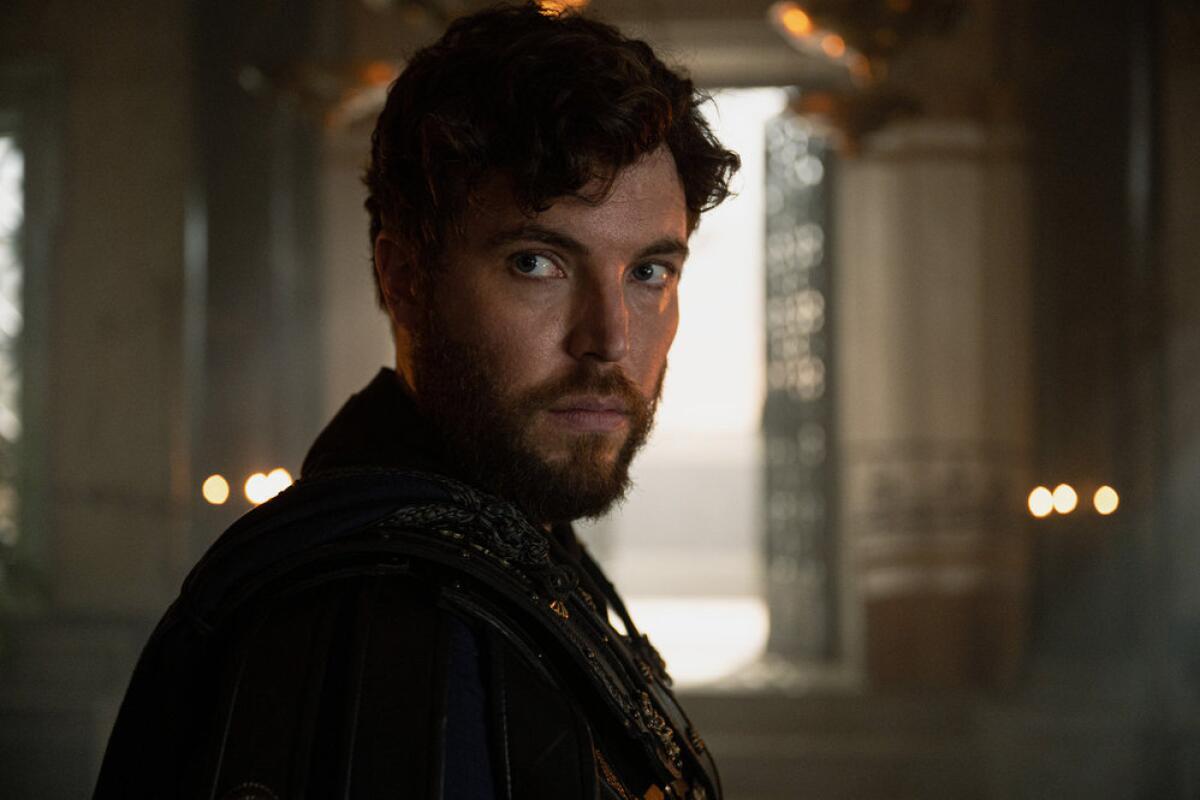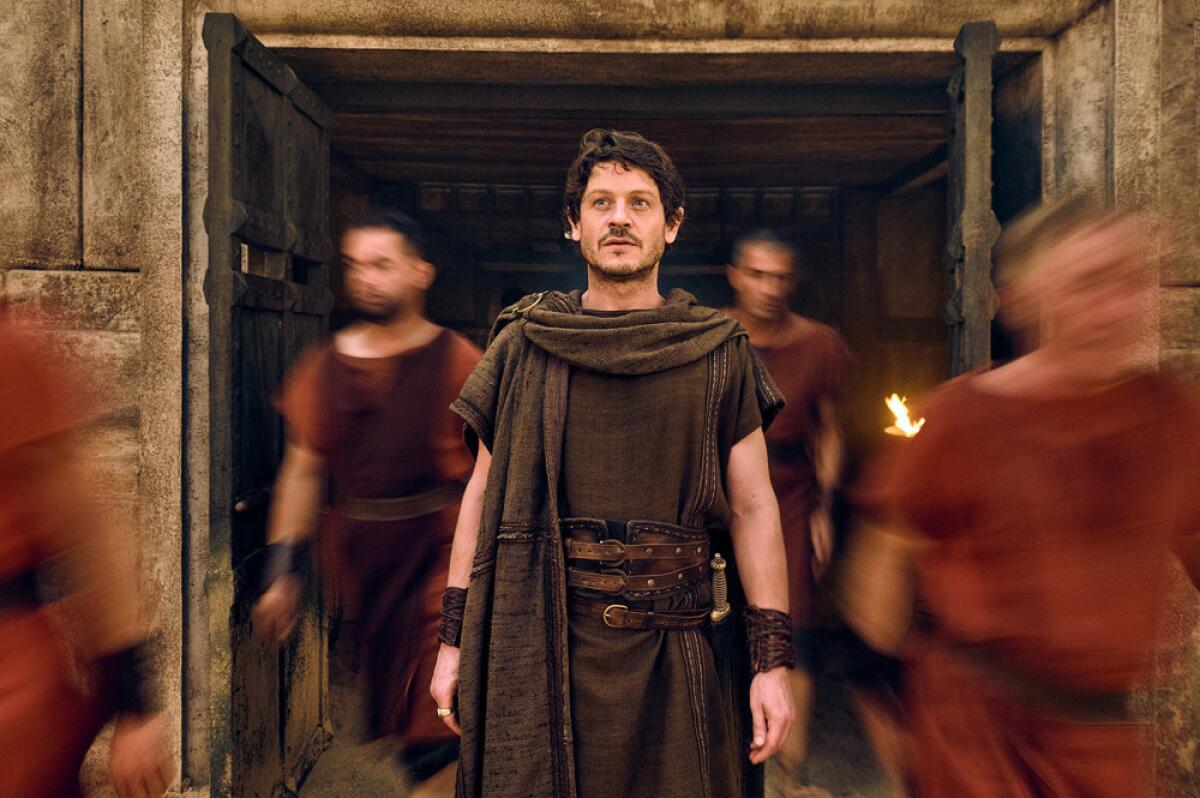‘Those About to Die’ retreads blood-soaked ground of previous ancient Rome depictions

I’m not much given to making predictions, but it seems a safe bet that in 100 or even 500 years, in whatever has become the hot entertainment medium of the day, someone will be making an epic of ancient Rome. The context might be different, depending on, say, whether the audience is living in a republic or an empire, but the basics will remain the same: sex and violence, swords and sandals, bread and circuses, the decadent rich and the honest poor.
Filmmakers have been going to that well since there was film to make, and the world never has to wait long for a new bucketload to be drawn up from it. This week sees the release of a trailer for Ridley Scott’s “Gladiator” sequel, “Gladiator II” — note the numerals — and the premiere, Thursday, of a muscular new Peacock series, “Those About to Die,” which covers similar blood-soaked ground, on a presumably smaller budget.
It is the year 79, and “Rome, once the beacon of civilization, is now a cesspool of corruption and decay.” Anthony Hopkins, classing up the joint, plays Emperor Vespasian, who is preparing to die and is considering which of his two sons will succeed him. Stone-faced Titus (Tom Hughes), forever armored, is a model of soldierly rectitude, though controversial in Roman circles for having a Jewish girlfriend, Berenice (Lara Wolf), a queen yet; neither does their relationship sit well with the enslaved Jews who have been building the Colosseum, a.k.a. the Flavian Amphitheater, rising in the background. His brother, the unappealing Domitian (Jojo Macari), is supposedly a deft politician, though without tact or a poker face. He’s a walking inferiority complex, compensating with random acts of violence, like a Caligula fanboy, and looks ready at any minute to pop off like Vesuvius.
1

2

1. Tom Hughes as Titus. (Reiner Bajo/Peacock) 2. Jojo Macari as Domitian. (Reiner Bajo/Peacock)
At the hub of several narrative strands is Tenax (Iwan Rheon), a first-century bookmaker, whose busy betting shop is one of the series’ liveliest creations, and the one I was most ready to believe. Ambitious to move up in the ancient world, Tenax seeks to add a new “faction” to the four established racing stables, whose horses and drivers exclusively compete in the Circus Maximus, a giant track out back of the imperial residence. The star of that show, and central to Tenax’s plans, is chariot racer Scorpus (Dimitri Leonidas), the real-life Mario Andretti of the age, who refers to himself in the third person and runs a sideline in drunken carousal.
Though he is the series’ most charming character — due largely to Rheon’s own charisma — seemingly a decent boss and good to poor children, Tenax is also a schemer, a cheat and much worse. (The first episode opens with his having a debtor’s throat cut. “No value in mercy,” he’ll tell the kids who do his odd jobs.) But the filmmakers have given him an all-access pass, from plebeian alleyways to marbled halls of power, and he is forever walking in unannounced on people who could literally have his head. Such confidence does not keep him out of trouble.
Later in the series, without abandoning any of his other projects, Tenax will become an impresario, masterminding “entertainments” at the Colosseum — Flo Ziegfeld, if Fanny Brice and Will Rogers were made to fight to the death, or if the Ziegfeld girls were eaten by alligators. To be sure, show business and the underworld have long been linked in the pop, and the actual, culture, and “Those About to Die” flirts with a host of genres: backstage drama, crime story, political thriller, family drama, teen romance, soft porn, torture porn.

Working for Tenax, indeed transforming his business, is Cara (Sara Martins), newly arrived from North Africa. Multilingual, literate, with a head for figures and a talent for innovation — and arguably the series’ smartest person — she has followed her kidnapped children to Rome in hopes of bringing them home. Daughters Jula (Alicia Edogamhe) and Aura (Kyshan Wilson) wind up at the slave market, while son Kwame (Moe Hashim), small but mighty, has been attached to the gladiators, as good as a death sentence. (There is the usual oversized monstrous foe to overcome.) Norseman Viggo (Johannes Johannesson) is the friend Kwame makes at gladiator camp in one of the series’ healthier relationships, and if I have to tell you that they will eventually be forced to face each other in the arena — the cruelty is the point — you need to see more movies.
Among other prominent characters, but by no means rounding out a big cast, are rich creeps Marsus (Rupert Penry-Jones) and Antonia (Gabriella Pession), who have a stake in one of the factions, and on the low end, three frisky Spanish brothers (Gonçalo Almeida as Elia, Pepe Barroso as Fonsoa and Eneko Sagardoy as Andria), who have come to Rome hoping to sell their speedy Andalusian horses. Many of these people will become involved with one another; it’s a busy show; there’s a lot to keep straight.
There have been many approaches to this material, from farcical comedy to jolly schlock to art film. Where HBO’s 2005 series “Rome,” from John Milius, took a relatively intellectual approach, “Those About to Die” is melodrama pure and simple; that it’s produced and largely directed by Roland Emmerich, known for “Independence Day” and the 1998 “Godzilla,” and developed by Robert Rodat, Emmerich’s collaborator on “The Patriot” (he did also write “Saving Private Ryan”), should give some clue to its dramatic methods and aims. This isn’t the high road to Rome, though neither is it the lowest. There is some history mashed up in here and an evident attempt to fill the screen and story with accurate period details, though the digital effects and backgrounds tend to take one out of the human reality and into a video game.
As to the sex and the violence, yes, we’ve seen the frescoes and mosaics and know the Romans had inventive erotic lives, but on streaming television, these scenes, which arrive with regularity, come across as tediously gratuitous. (All the naked people — more women than men, unsurprisingly, and sometimes just thrown in as window dressing — are, naturally, extremely good-looking.) As to the gory that was Rome, there are brawls, murders, mutilations, executions, death by CGI wild animal and multi-chariot pileups. Traditionally, these sorts of pictures have allowed producers to peddle items of prurient interest under cover of edification, while maintaining an attitude of moral superiority that would have made little sense to the people the show is about.
And if we’re not executing people in public anymore, or throwing them to the lions for a thrill, we do still apparently enjoy watching actors pretend to do it. What does that say about us?
More to Read
The complete guide to home viewing
Get Screen Gab for everything about the TV shows and streaming movies everyone’s talking about.
You may occasionally receive promotional content from the Los Angeles Times.







